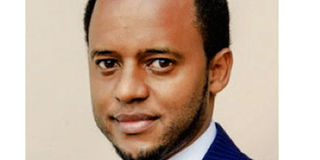We risk rolling back democratic gains

Edward Serucaca Jnr
What you need to know:
- We must move past political will that only remains in rhetoric, sloganeering and on paper.
As we come to the close of the year, three events from the past days stand out; First, the national commemoration of Anti-Corruption Day and second, the sentencing of two junior officers for their role in three deaths that occurred in the November 2020 riots and US sanctions against a senior military officer.
As Uganda commemorated Anti-Corruption week in an event graced by His Excellency Yoweri Museveni, the IGG, Beti Kamya relayed a message, ostensibly to set the tone for her office’s key initiatives to combat corruption over the next year.
In her remarks, she laid out what seems to be a clear plan to give corruption a face through consistent and structured lifestyle audits for public officials.
She enlivened her proposal by questioning how a public official earning a paltry salary per month is able to put up a palatial set of apartments and drive very expensive cars.
Unfortunately, as the saying goes “even the best laid plans sometimes go awry” and this seems to be the case from the get-go. As we would hear later, the President while launching the Lifestyle Audit Campaign at the occasion placed a silent “caveat “on its use as he cautioned the IGG to be careful while executing the campaign as “the thieves may be prompted to invest the loot outside Uganda”.
This definitely cut a different tone from the one the President had on May 20 in a meeting held with the 59 newly elected Independent NRM leaning MPs at State House Entebbe where a tough talking Museveni said corruption was failing the country’s development agenda.
In that meeting he asked: “I am told there is corruption even in Parliament. How can this be?” “I am going to crash corruption and whoever is involved in corruption is going to face my full force,” President Museveni warned. Last week however, the President sounded a different tone - asking the IGG to “go slow” on the corrupt-justifying his request by stating that the corrupt are actually siphoning off “government” money and investing it within the country.
Seemingly unrelated, last week the Division Court Martial sitting at Kakiri (Wakiso) sentenced a UPDF officer and an LDU personnel to life and 35 years imprisonment (respectively) for shooting dead three civilians during the November 2020 riots in Kampala.
The 2020 Uganda Police Annual report states that 263 incidents were reported out of which 53 deaths were by shooting during the riots that broke out in the pre-electoral environment.
In a BBC documentary footage pinning soldiers, police officers and individuals in civilian clothing shooting at unarmed civilians, the horror of those two days was brought to the fore.
A year later, we have just two actors being held accountable. This got me pondering on the famous aphorism “Justice must not only be done, but must also be seen to be done”.
For many, this outcome has been castigated as a mere charade considering all the overwhelming evidence pointing at various perpetrators, and the time it has taken to finally get “justice”. The two sentenced criminals account for three persons -where is the justice for the remaining 50? How long before those responsible can be brought to account?
Around the same time, the US government slapped Uganda’s Chieftaincy of Military Intelligence (CMI) head Maj Gen Abel Kandiho with sanctions over the CMI’s conduct in processing accused persons.
This comes amidst heightened allegations of torture of civilians by CMI personnel. Various authorities including our Parliament have raised concerns over fair hearing or rather lack of it during investigations carried out by the Intelligence organ, which many believe would in fact be an opportunity to bring to light witness accounts by those that have suffered at the hands of errant security personnel using torture.
This raises the question, rather than wait for sanctions from external actors why not embrace the culture of holding public officers to account, why not build functional and transparent mechanisms through which public officers can be brought to account at all levels and in all spheres; that is in relation to use of public funds and use of power obtained by virtue of one’s public office?
As we look to 2022, we must move past political will that only remains in rhetoric, sloganeering and on paper. The gap between policy and its implementation; in particular the empowerment of implementing agencies tasked with ensuring public accountability must be bridged urgently.
The author, Mr Edward Serucaca Jnr, is a lawyer and advocacy strategist for non-profits. [email protected]




